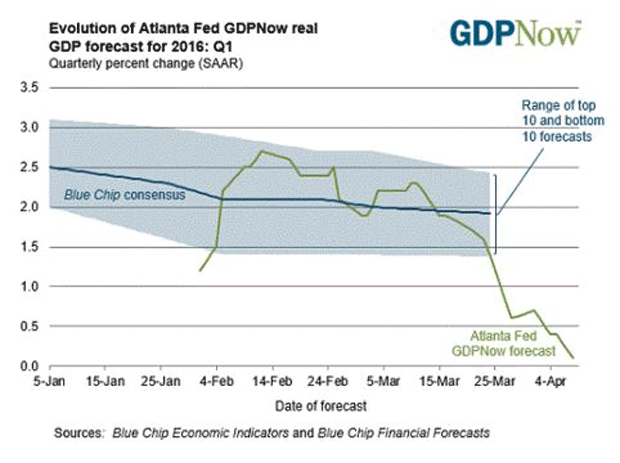Will U.S. economy shake off its latest deep freeze?
Getting that old sinking feeling again? You're not alone.
The U.S. economy barely stayed afloat in the first three months of the year, data show, the third year in a row that growth has faltered in the first quarter. Forecasters are duly chopping their growth estimates for the period, casting doubt on the economy's underlying strength.
The Federal Reserve Bank of Atlanta on Friday lowered its estimate for gross domestic product between January and March to 0.1 percent (see chart below). Bank of America Merrill Lynch analysts peg growth for the quarter at 0.2 percent. Macroeconomic Advisers puts it at 0.7 percent. Capital Economics, normally fairly chipper on the country's economic prospects, forecasts annualized GDP in the first quarter of 1 percent.
The main drags on growth include slower personal consumption, decreasing wholesale inventories, a widening trade deficit and the ongoing hit to the energy sector from low oil prices.
"Following on from the 1.4 percent gain in the final quarter of last year, that suggests the U.S. economy lost more momentum and could be headed for a full-blown downturn," said Paul Ashworth, chief U.S. economist with the research firm, in a note.
Unless it isn't. While noting the economy's weak pulse, Ashworth dismisses the risk of the U.S. falling into recession as "nonsense," pointing out that in the last five years GDP has slipped below 1 percent in six separate quarters before regaining speed. He predicts that solid job growth, healthy consumer spending and a rebound in manufacturing, among other factors, will drive growth over the rest of the year.
Unless it doesn't. Deutsche Bank economist Joseph LaVorgna, who resides at the other end of the confidence meter, speculates that the economy is unlikely to fully recover before the next recession strikes.
He notes that since the recession ended in June 2009, inflation-adjusted GDP growth has averaged only 2.1 percent annually, compared with 3.5 percent between 1947 and 2007, just before the roof caved in. And that pattern may continue.
LaVorgna writes in a report: "Recent data have exhibited symptoms of secular stagnation. Real GDP growth has slowed, raising the risk that the output gap will not close before the onset of the next recession, a nearly unprecedented occurrence in post-WW II history."
Nonsense! That's more or less what William Dudley, president of the Federal Reserve Bank of New York, said in a speech Friday, when he told an audience in Manhattan that he expects the economy to continue its slow trudge back to respectability this year.
Confused yet? Welcome to the club. Robert King, a senior economist with Jerome Levy Forecasting Center, politely excuses the disparate forecasts by allowing that 2016 is likely to be an "exceptionally confusing one for pattern-matching economists."
In King's view, the confusion stems largely from the origin of the problems dogging the U.S. economy. It's not the usual suspects, such as the Fed throttling an upturn by raising interest rates. If growth continues to falter, this downturn will have been hatched overseas.
"The unprecedented scale of the global economy's impact on the U.S. economy, and the gargantuan problems of overcapacity faced by China and the other emerging markets, mean that the drivers of the next U.S. recession are unique," King said by email. "U.S. consumers are not going to trigger the next downturn, but nor will they be immune to its effects. The falloff in U.S. exports is more telling of the U.S. outlook for 2016 than trends in housing, employment or retail sales."
But, but...how about the frisky labor market?
"Job growth is not a reliable forward-looking indicator. What is a reliable forward-looking indicator is profits." King said. "Profits have declined for five straight quarters year-over-year and that points to weakening growth and employment in 2016."
Corporate earnings season starts Monday. Happy Friday.
